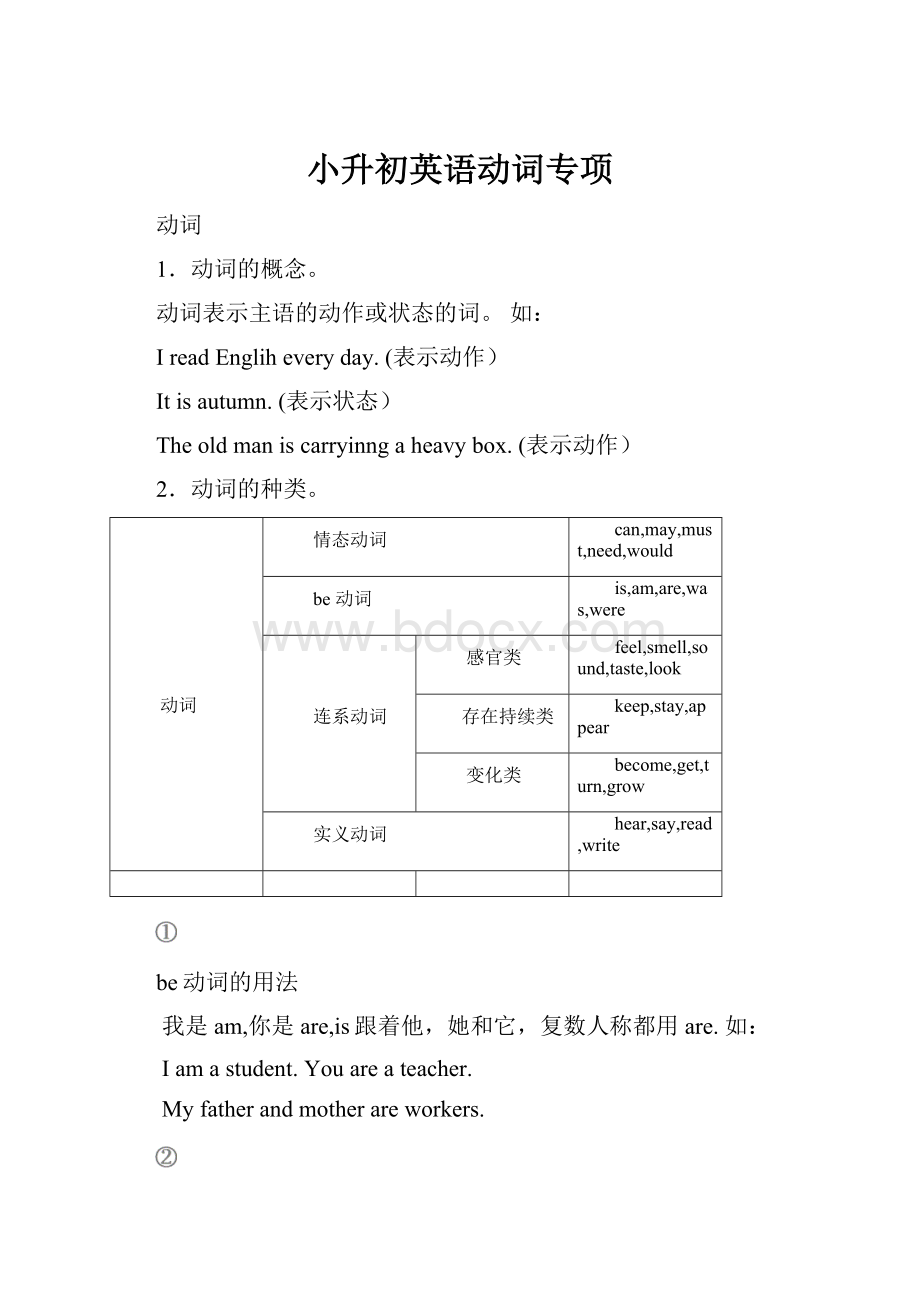小升初英语动词专项.docx
《小升初英语动词专项.docx》由会员分享,可在线阅读,更多相关《小升初英语动词专项.docx(38页珍藏版)》请在冰豆网上搜索。

小升初英语动词专项
动词
1.动词的概念。
动词表示主语的动作或状态的词。
如:
IreadEngliheveryday.(表示动作)
Itisautumn.(表示状态)
Theoldmaniscarryinngaheavybox.(表示动作)
2.动词的种类。
动词
情态动词
can,may,must,need,would
be动词
is,am,are,was,were
连系动词
感官类
feel,smell,sound,taste,look
存在持续类
keep,stay,appear
变化类
become,get,turn,grow
实义动词
hear,say,read,write
be动词的用法
我是am,你是are,is跟着他,她和它,复数人称都用are.如:
Iamastudent.Youareateacher.
Myfatherandmotherareworkers.
连系动词的用法
(1)连系动词一般不用于现在进行时。
如:
误:
Theclothisfeelingsoft.正:
Theclothfeelssoft.
(2)连系动词不用副词来修饰,其后跟形容词做表语。
如:
误:
Youshouldkeepquietlyinthehospital.正:
Youshouldkeepquietinthehospital.
情态动词的用法
情态动词的用法
考点1.can和could的用法。
表示能力,意为“能,会”。
Shecandrive,butshecan’trideabike.她会开车,但不会骑自行车。
Ihopetoofferyousomeusefuladvice.我希望给你一些有用的建议。
Hecangiveyousomebooks.他能给你一些书。
表示请求或允许,意为“可以”。
CanIuseyourtelephone?
我能用下你的电话吗?
Youcangonow.你现在可以走了。
Wecanaskherforhelp.我们可以向她寻求帮助。
could是can的过去式,表示过去的能力。
Icouldswimallthewayacrossthelake,butIcan’tnow.我以前可以游过这片湖,但现在不能了。
Hecouldcookwhenhewasyoung.他年轻时会做饭。
Hecouldbesaved,buthewasn’tsenttohospitalintime.他原本可以获救的,但他没有被及时送到医院。
表示请求时,could的语气比can更加委婉,肯定回答用can,而不用could。
----Couldyoulendyourcartome?
你可以把你的车借给我吗?
----Ofcourse,Ican.当然,可以。
考点2:
may和might的用法。
表示请求或允许,意为“可以”。
其否定回答用mustn’t或can’t,意为“不可以、不允许、禁止”,不可用maynot。
Youmaygohomenow.你现在可以回家了。
MayIhaveawordwithyou,please?
我能跟你讲话吗?
MayIhaveit?
我能拥有它吗?
---MayIgonow?
我现在可以走了吗?
---No,youmustn’t.不,不可以。
表示推测,意为“可能、也许”,用于肯定句中。
Hemaybeathome.他可能在家里。
Theymaycometomorrow.他们明天可能会来。
might是may的过去式,表示推测时,可能性比may小。
Hemightgotoseethedoctor.他可能去看医生了。
Shemightgetangrywithyou.她可能生你气了。
考点3:
must的用法。
表示必须,否定式为mustn’t,意为“禁止”。
Imustgonow.我现在必须走了。
Wemuststudyhard.我们必须努力学习。
Youmustn’tplaywithfire.你一定不能玩火。
表示推测,意为“一定”,只用于肯定句中,否定句中用can’t。
Themanovertheremustbemyfather.那边那个男的一定是我爸爸。
Thelightison.Someonemustbeathome.灯亮着,家里一定有人。
Thatgirlontheplaygroundcan’tbemysister,becauseshehasgoneabroad.那个女孩一定不是我姐姐,因为她到国外去了。
以must开头的疑问句,肯定回答用must,而否定回答则用needn’t或don’thaveto,意为“不需要、不必”,而不能用mustn’t。
---MustIhandinthehomeworknow?
我需要马上交作业吗?
---No,youneedn’t/don’thaveto.不,你不需要。
考点4:
need的用法。
need作情态动词用时,没有人称和数的变化,直接接动词原形,只用于否定句和疑问句中,构成否定句和疑问句时不用助动词。
用need提问时,肯定回答用must,否定回答用needn’t。
Youneedn’tdoit.你不需要做那件事。
---NeedIcomeheretomorrow?
我明天需要来吗?
---Yes,youmust/No,youneedn’t(don’thaveto).是的,你必须来。
/不,你不必。
need作行为动词时,有人称和数的变化,可用于肯定句、否定句或疑问句中,构成否定句和疑问句时要用助动词do,does,did。
Theboyneedstheparents’love.这个孩子需要父母的爱。
Theflowersintheparkneededalotofwater.花园里的花需要很多水。
考点5:
shall和should的用法。
shall用于第一人称,表示征求对方意见。
ShallIopenthewindow?
我可以打开窗户吗?
Shallwehavelunchatarestaurant?
让我们在餐馆吃午饭好吗?
shall用于第二、三人称时,表示警告、命令、允诺等。
Everyoneshallkeepsilentduringthemeeting.会议期间每个人都要保持安静。
Myfathershallbuymeanewbicycleonmybirthday.我爸爸会在我生日的时候给我买辆新的自行车。
should用来表示义务、责任,意为“应该”。
Weshouldobeythetrafficrules.我们应该遵守交通规则。
Thechildrenshouldlistentotheirparents.孩子应该听父母的话。
考点6:
will和would的用法。
will表示请求、询问或意愿。
WillyouhelpmewithmyEnglish?
你可以帮我学习英语吗?
Hewilldoanythingforhisfamily.他愿意为自己的家庭做任何事。
would用来表示过去的意愿或委婉的询问。
WhenIwasyoung,Iwoulddoalotofhardwork.当我年轻的时候,我愿意做很多艰苦的工作。
Wouldyoupleasetellmehowtogettothezoo.你能告诉我怎么去动物园吗?
Wouldyouliketocometomyparty?
你愿意来参加我的晚会吗?
考点7:
情态动词用法易混点。
can和beableto表示能力时,can只用于一般现在时和一般过去时,其他时态要用beableto。
另外,表示成功做成某事时,用beableto。
Tomcouldn’tridethebike,butnowhecan.汤姆以前不会骑自行车,但是现在会了。
Hewillbeabletocamebackinthreedays.再过三天他就可以回来了。
Abigfiretookplaceinthehouse,butallthepeoplewereabletoescapefromit.房子起大火了,但是所有人都成功逃脱了。
must和haveto均表示“必须”,但must强调主观意愿,haveto强调客观需要。
Wemuststudyhardatschool.在学校我们必须努力学习。
ThesunissettingandIhavetogohome.太阳要落山了,我必须回家了。
could,would,might等有时并不表示过去,而是表示委婉客气的语气。
CouldIuseyourpen?
我可以用你的笔吗?
Wouldyoumendthebikeforme?
你可以帮我修下自行车吗?
实义动词的用法
实义动词一般在句子中做谓语,有人称,时态的变化。
实义动词可以单独用作谓语。
如:
IlikeEnglish.Thechildisplayingthepiano.
动词的基本形式
英语动词有五种基本形式,即动词原形,第三人称单数,过去式,现在分词和过去分词。
动词原形用于固定用法和一般现在时中主语非三单,第三人称单数用于一般现在时中主语为三单,过去式用于一般过去时,现在分词用于进行时,过去分词用于完成时和被动语态。
(1)动词原形变第三人称单数的规则,与名词变复数的规则大致一样:
规则
例词
一般的动词在词尾加-s
works,reads,looks,lives
以s,x,ch,sh,o结尾的单词在词尾加-es
finishes,guesses,catches,goes,mixes
以辅音字母加y结尾的动词,变y为i,加es
flies,studies,carries
以元音字母加y结尾的动词,直接加s
stays,plays
特殊
has
(2)现在分词
规则
例词
一般情况直接在词尾加-ing
working,reading,looking
以不发音的e结尾的动词去e加-ing
smiling,moving,taking,writing
以字母y结尾的直接加-ing
carrying,studying
以重读闭音节结尾且末尾只有一个辅音字母动词,要双写末尾字母加-ing
sitting,digging,cutting,planning,shopping,
stopping,swimming
以字母ie结尾的动词,将ie改为y加ing
die-dying,lie-lying,tie-tying
(3)动词的过去式(规则变化)
规则
例词
一般在词尾加-ed
worked,asked,jumped
以e结尾的动词直接加—d
closed,liked,agreed
以辅音字母加y的动词,变y为i,加-ed
studied,carried,tried
以元音字母加y的动词,直接加ed
played,stayed
不规则动词过去式
以重读闭音节且末尾只有一个辅音字母的动词,双写末尾字母加-ed
stopped,shopped,
planned,dropped
(1)
cost
cost花费
(35)
bring
brought带来
(2)
cut
cut切割
(36)
buy
bought买
(3)
hit
hit打击
(37)
fight
fought打架
(4)
hurt
hurt伤害
(38)
think
thought认为
(5)
let
let让
(39)
catch
caught抓住
(6)
put
put放
(40)
teach
taught教
(7)
read
read读
(41)
lend
lent借给
(8)
drive
drove驾驶
(42)
send
sent送
(9)
ride
rode骑
(43)
spend
spent花费
(10)
write
wrote写
(44)
build
built建筑
(11)
win
won赢
(45)
smell
smelt闻起来
(12)
get
got得到
(46)
meet
met遇见
(13)
become
became变得
(47)
feel
felt感觉
(14)
come
came来
(48)
keep
kept保持
(15)
run
ran跑
(49)
sleep
slept睡觉
(16)
begin
began开始
(50)
sweep
swept打扫
(17)
drink
drank喝
(51)
leave
left离开
(18)
ring
rang打电话
(52)
stand
stood站
(19)
sing
sang唱歌
(53)
take
took带走
(20)
swim
swam游泳
(54)
forget
forgot忘记
(21)
give
gave给
(55)
sell
sold卖
(22)
sit
sat坐
(56)
tell
told告诉
(23)
grow
grew生长
(57)
have
had有
(24)
know
knew知道
(58)
hear
heard听说
(25)
throw
threw扔
(59)
make
made制作
(26)
draw
drew画画
(60)
find
found发现
(27)
fall
fell落下
(61)
pay
paid支付
(28)
blow
blew吹
(62)
say
said说
(29)
do
did做
(63)
eat
ate吃
(30)
fly
flew飞
(64)
see
saw看到
(31)
wear
wore穿
(65)
lose
lost失去
(32)
go
went去
(66)
lie
lay躺
(33)
speak
spoke说
(67)
are
were是
(34)
break
broke打断
(68)
am,is
was是
三,动词的时态
当我们说时态结构的时候,指的是相应时态下的动词形式,也就是说时态体现在谓语动词的不同形式变化上。
下表简单说明了各个时态谓语动词的不同结构变化:
(注:
表中do代表动词)
时态
时态定义
谓语动词变化
时态标志词
现
在
进
行
时
1表示说话的此时此刻正在进行的动作或事情。
Sheissinginginthegym.
2表示即将到来或很快发生的事,常有“意图”“安排”或“打算”的含义,这样给人一种期待感。
Thetrainisleaving.
be动词+现在分词
(be+动词ing)
1.Now,Look,…….Listen,…….
2.—Whereissb?
---Sb.is/aredoing.
3.---Bequiet!
Sb.is/aredoing.
4.---Whatareyoudoing?
一
般
现
在
时
1表示当前或现阶段事物的状态、特征。
Sheisagoodstudent.
2表示经常性、习惯性、规律性的动作。
Sheoftengoestoschoolat9:
30.
3表示客观真理、客观存在、客观事实。
Theearthmovesaroundthesun.
主语三人称单数
主语+动词三单形式
Shegoes…
Shedoesn’tgo
Doesshego
1.often、sometimes、usually、always、never
2.everyday(months、years……)
3.onceaweek(month,year......)
4.twiceaweek(month,year....)
5.onMondays(Tuesdays.....)
主语非三单
主语+动词原形
Igo…
Idon’tgo
Doyougo.....?
一
般
过
去
时
1表示过去某一时间发生的动作、事件。
动词过去式:
动词+ed(talked)
1.thismorning、
2.yesterday,....ago、
3.lastyear/month/week
4.justnow
不规则的动词过去式(went)
一
般
将
来
时
1表示打算、计划或意图要做的动作或事件。
begoingto+动词原形
1.tomorrow、
2.nextweek/month/week
3.in+时间段
will+动词原形
一般现在时练习
一.写出下列动词的第三人称单数
drink________go_______stay________make________
look_________have_______pass_______ carry______
come________ watch______plant_______fly________
study_______brush________do_________ teach_______
二、用括号内动词的适当形式填空。
1.Heoften________(have)dinnerathome.
2.DanielandTommy_______(be)inClassOne.
3.We_______(notwatch)TVonMonday.
4.Nick_______(notgo)tothezooonSunday.
5.______they________(like)theWorldCup?
6.What_______theyoften_______(do)onSaturdays?
7._______yourparents_______(read)newspaperseveryday?
8.Thegirl_______(teach)usEnglishonSundays.
9.SheandI________(take)awalktogethereveryevening.
10.There________(be)somewaterinthebottle.
11.Mike_______(like)cooking.
12.They_______(have)thesamehobby.
13.Myaunt_______(look)afterherbabycarefully.
14.Youalways_______(do)yourhomeworkwell.
15.I_______(be)ill.I’mstayinginbed.
16.She_______(go)toschoolfromMondaytoFriday.
17.LiuTao_______(do)notlikePE.
18.Thechildoften_______(watch)TVintheevening.
19.SuHaiandSuYang_______(have)eightlessonsthisterm.
20.-Whatday_______(be)ittoday?
-It’sSaturday.
三.按照要求改写句子。
1.DanielwatchesTVeveryevening.(改为否定句)
___________________________________________________
2.Idomyhomeworkeveryday.(改为一般疑问句,作否定回答)
________________________________________________________
3.Shelikesmilk.(改为一般疑问句,作肯定回答)
___________________________
4.Amylikesplayingcomputergames.(改为一般疑问句,作否定回答)
___________________________________________________
5.Wegotoschooleverymorning.(改为否定句)
_______________________________________________________
6.HespeaksEnglishverywell.(改为否定句)
___________________________________________________
7.Iliketakingphotosinthepark.(对划线部分提问)
________________________________________________________
8.JohncomesfromCanada.(对划线部分提问)
___________________________________________________
9.Sheisalwaysagoodstudent.(改为一般疑问句,作否定回答)
________________________________________________________
10.SimonandDan